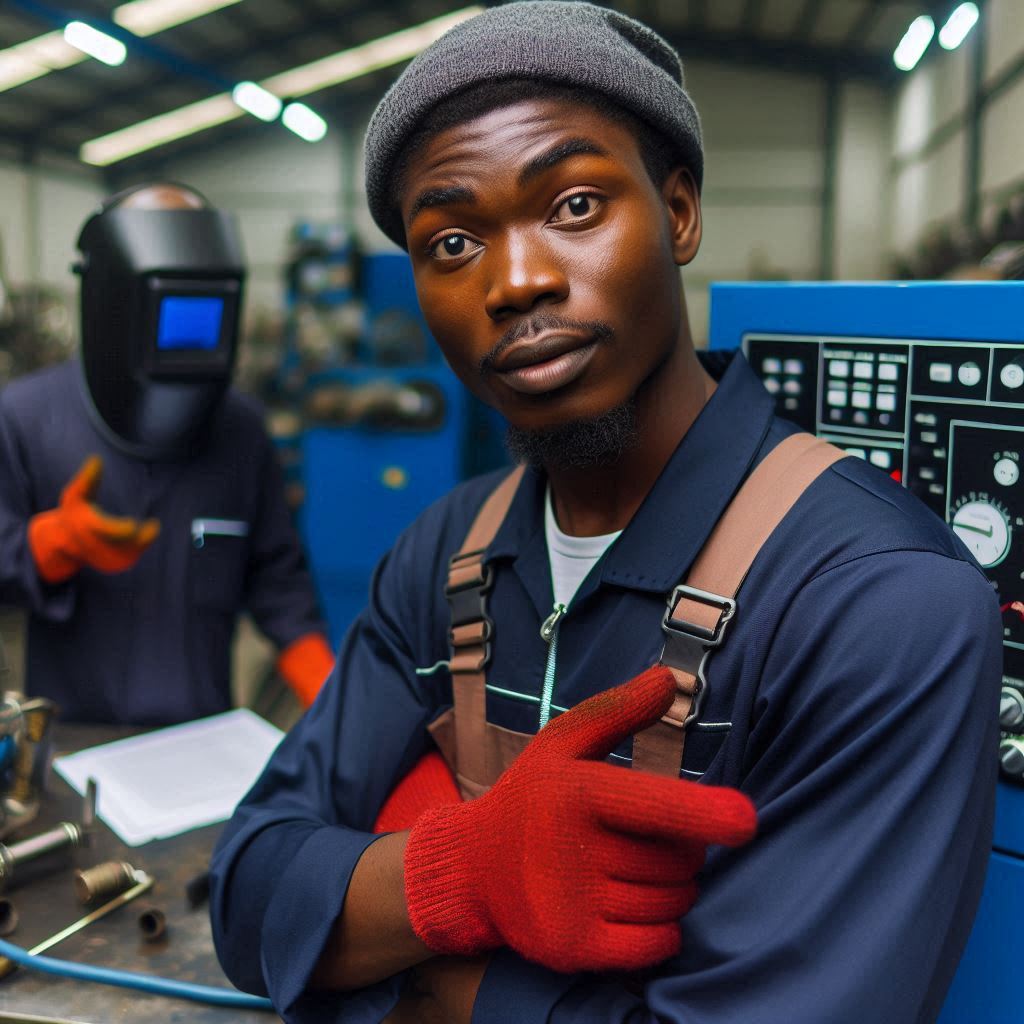Introduction
Welding is the process of joining materials like metals or thermoplastics by fusion. It is crucial for infrastructure development and industrial growth in Nigeria.
The history of welding in Nigeria dates back to the early 20th century. During the colonial era, welding techniques were introduced by British engineers for construction projects and maintenance of railway tracks.
As Nigeria gained independence in 1960, the demand for skilled welders increased, leading to the establishment of technical schools and vocational training centers.
Today, welding plays a significant role in various industries such as construction, oil and gas, manufacturing, and automotive. Skilled Nigerian welders are sought after both locally and internationally for their expertise in welding techniques.
The importance of welding in Nigeria cannot be overstated as it is essential for the development of infrastructure, creating job opportunities, and contributing to the country’s economy.
With advancements in technology, Nigerian welders continue to improve their skills and adapt to modern welding techniques.
Essentially, the history of welding in Nigeria reflects its growth and significance in various industries over the years.
As the country continues to develop, welding will remain a vital aspect of construction and manufacturing processes, driving progress and innovation.
Pre-colonial Era: Traditional Welding Techniques
Indigenous Methods of Joining Metals in Early Nigerian Society
In early Nigerian society, indigenous methods of joining metals were essential for local craftsmanship and infrastructure development. These techniques were the backbone of creating tools, weapons, and household items, essential for daily life.
Blacksmiths played a central role, mastering these methods long before the advent of modern welding technologies.
Role of Blacksmiths in Early Nigerian Society
Blacksmiths were not just artisans; they were revered members of their communities, entrusted with the creation of essential items.
Their skills were pivotal in shaping agricultural tools, weapons, and decorative items, often incorporating cultural and spiritual significance.
These blacksmiths were experts in heating, hammering, and shaping metals, using techniques that varied widely across different regions and ethnic groups.
Their knowledge was deeply rooted in tradition and passed down through generations, ensuring the continuity of their craft.
Examples of Traditional Welding Practices
Traditional Nigerian welding practices were diverse, tailored to the specific needs and resources of different communities.In the northern regions, Fulani blacksmiths were renowned for their expertise in smelting iron.
They used primitive furnaces and forges, crafting agricultural tools and weapons with remarkable precision and durability.
Their techniques involved heating iron ore to high temperatures, then shaping and welding it through hammering, a process that required great skill and patience.
In the southeastern part of Nigeria, the Igbo people were masters of bronze casting and metalworking. They developed sophisticated methods for creating intricate sculptures, masks, and ceremonial objects.
These artisans used clay molds and traditional casting techniques, pouring molten bronze into carefully crafted molds to produce detailed and ornate items.
This practice not only showcased their technical skill but also their artistic vision, blending functionality with beauty. These traditional welding practices were not only practical but also deeply cultural.
They fostered a sense of community and pride in craftsmanship, with techniques and knowledge passed down through generations.
This rich tradition of metalworking underscored the ingenuity and resourcefulness of early Nigerian societies, showcasing their ability to utilize local materials and techniques effectively.
Generally, the role of blacksmiths and indigenous methods of joining metals in early Nigerian society highlights the significance of craftsmanship, innovation, and community collaboration.
These practices laid a solid foundation for modern welding techniques, demonstrating a profound cultural heritage intertwined with technological advancement.
The legacy of these practices continues to inspire and influence contemporary metalworking in Nigeria and beyond.
Read: Impact of Agricultural Engineering on Crop Production
Colonial Influence: Introduction of Modern Welding
During the colonial era in Nigeria, there was a significant impact on the welding industry as a result of European colonization. This period brought about the introduction of modern welding techniques that revolutionized the way welding was practiced in the region.
Impact of European Colonization on Welding Practices
With the arrival of European colonizers in Nigeria, there was a transfer of knowledge and technology in various industries, including welding. European countries had advanced welding techniques that were more efficient and effective compared to traditional methods used in Nigeria.
This exchange of knowledge led to the gradual phasing out of traditional ways of welding and the adoption of modern practices. Welders in Nigeria began to learn and implement new welding techniques that were introduced by the colonizers.
Introduction of Industrial Welding Techniques
European colonization also brought about the introduction of industrial welding techniques in Nigeria. Industrialization was on the rise during this period, and welding played a crucial role in the development of infrastructure and manufacturing industries.
New welding methods such as arc welding, gas welding, and resistance welding were introduced to meet the demands of the growing industrial sector. These techniques allowed for faster and more precise welding, resulting in stronger and more durable welds.
Establishment of Welding Schools and Workshops
To facilitate the adoption of modern welding techniques, colonial authorities established welding schools and workshops in Nigeria. These institutions provided formal education and training in welding practices to both aspiring welders and experienced craftsmen.
Welding schools equipped students with the necessary skills and knowledge to work in various industries that required welding services. The workshops served as practical training grounds where students could hone their welding techniques under the guidance of experienced instructors.
Overall, the colonial influence on welding in Nigeria paved the way for the modernization and advancement of the welding industry in the country.
The introduction of industrial welding techniques and the establishment of welding schools and workshops laid the foundation for a more skilled and competent workforce in the field of welding.
Read: Challenges Facing Agricultural Engineers in Nigeria
Post-Independence Era: Growth and Development
Expansion of Welding Industry in Nigeria
The expansion of Nigeria’s welding industry signifies a pivotal advancement in the country’s industrial landscape. This growth is driven by the adoption of new welding technologies and the proactive role of government in promoting the sector.
Adoption of New Welding Technologies
In recent years, Nigeria has witnessed a significant shift towards modern welding technologies. These advancements include adopting automated welding systems, robotic welding, and techniques like laser welding and friction stir welding.
These technologies enhance precision, efficiency, and the overall quality of welded products, meeting international standards and improving competitiveness in global markets.
Role of Government in Promoting the Welding Sector
The Nigerian government plays a crucial role in fostering the growth of the welding industry. Policies and initiatives aimed at supporting local manufacturing, infrastructure development, and vocational training programs have been instrumental.
These efforts include incentivizing investment in welding technology, enhancing SME access to financing, and promoting R&D in welding innovations.
Government collaborations with industry stakeholders and educational institutions have also been pivotal. Partnerships develop curriculum and certification programs aligned with industry needs, enabling a skilled workforce to utilize new technologies effectively.
Moreover, regulatory frameworks set by the government ensure compliance with safety, environmental, and quality standards in welding practices.
This regulatory oversight enhances consumer confidence in locally produced goods and services, supporting sustainable growth and development in the welding sector.
The expansion of Nigeria’s welding industry not only stimulates economic growth but also creates employment opportunities and enhances industrial capabilities. It positions Nigeria as a competitive player in the global welding market, capable of meeting diverse industrial demands across sectors.
Therefore, the expansion of Nigeria’s welding industry is driven by the adoption of new technologies and the supportive role of government policies and initiatives.
These factors collectively contribute to the sector’s growth, fostering innovation, enhancing quality standards, and positioning Nigeria as a hub for welding excellence in Africa and beyond.
Continued government support and industry collaboration will be crucial in sustaining this momentum and maximizing the sector’s potential for future growth and development.
Read: Role of Agricultural Engineers in Nigerian Agriculture
Gain More Insights: Structural Engineering Safety Standards in Nigeria
Challenges and Opportunities in the Welding Industry
Lack of skilled welders in Nigeria
Nigeria, like many other countries, faces a shortage of skilled welders in the industry. This shortage can be attributed to various factors such as inadequate training programs, lack of awareness about the profession, and limited resources for skill development.
One major challenge in Nigeria’s welding industry is the lack of formal training programs for welders.
Additionally, many young Nigerians are not aware of the potential career opportunities available in the welding industry. This lack of awareness results in fewer individuals pursuing a career in welding, further exacerbating the shortage of skilled professionals.
Furthermore, the limited resources for skill development in Nigeria hinder the growth of the welding industry. Without access to proper training facilities, equipment, and materials, aspiring welders struggle to acquire the necessary skills and knowledge to excel in the field.
Quality control and safety issues
Another challenge that the welding industry in Nigeria faces is the lack of stringent quality control measures and safety protocols. Inadequate supervision and oversight in welding projects often lead to substandard workmanship and safety hazards.
Without proper quality control measures in place, the integrity of welded structures and components is compromised, posing a risk to public safety. Poor welding practices can result in structural failures, leading to accidents, injuries, and even fatalities.
Moreover, the absence of standardized safety protocols in the welding industry puts welders at risk of exposure to hazardous fumes, gases, and materials.
Without proper safety training and equipment, welders are vulnerable to occupational health hazards, including respiratory illnesses and burns.
To address these challenges, the Nigerian government and stakeholders must prioritize quality control measures and safety standards in the welding industry.
By enforcing strict regulations and providing adequate training and protective gear, the industry can improve the quality of work and ensure the well-being of welders.
Opportunities for growth and job creation in the welding sector
Despite the challenges facing the welding industry in Nigeria, there are significant opportunities for growth and job creation within the sector. With the country’s growing infrastructure development and industrialization, the demand for skilled welders is expected to rise.
Infrastructure projects like road construction, pipelines, and power plants offer welders ample opportunities to showcase their expertise. By participating in these projects, welders can contribute to the development of critical infrastructure and support economic growth.
Additionally, advancements in technology and automation are shaping the future of welding, creating opportunities for innovation and specialization in the field.
Welders who adopt technologies like robotic systems and CAD software can enhance their skills and stay competitive.
Furthermore, the welding industry offers a diverse range of career paths, from structural welding and pipefitting to underwater welding and aerospace fabrication.
As the demand for specialized welding services continues to grow, aspiring welders can explore various career opportunities and carve a niche for themselves in the market.
Most Importantly, despite challenges, Nigeria’s welding industry offers growth and job opportunities.
By addressing these challenges and capitalizing on the opportunities presented, the welding industry can thrive and contribute to the country’s industrial development.
Read: Curriculum Overview of Agricultural Engineering Courses

Explore Further: Wood Production Engineering: Apprenticeship Programs
Uncover the Details: Comparing Nigerian and International Civil Engineering Practices
See Related Content: Notable Civil Engineering Projects in Nigeria
Transform Your Career with Expert Guidance
Get personalized mentorship consulting that’s tailored to your unique path. Our expert advice is actionable and exclusive.
Get StartedExplore Further: Postgraduate Options for Chemical Engineers in Nigeria
Innovations and Advancements in Nigerian Welding
When it comes to welding in Nigeria, there have been significant innovations and advancements over the years. The indigenous contributions to welding technology have played a crucial role in shaping the industry.
Nigerian welders adapt traditional techniques to modern practices, merging both for efficient solutions. They have also developed their own unique methods that have gained recognition internationally.
Indigenous Contributions to Welding Technology
One of the standout features of Nigerian welding is the incorporation of local materials and techniques into the welding process. For example, Nigerian welders have utilized traditional blacksmithing methods to create intricate and durable welds.
Additionally, Nigerian welders have developed customized welding tools and equipment tailored to local environments and conditions. This innovative approach has helped them overcome challenges and increase efficiency in their work.
Collaboration with International Welding Companies
Nigerian welders have also collaborated with international welding companies to exchange knowledge and expertise. This partnership has enabled Nigeria to transfer advanced welding technologies and techniques, keeping local welders updated with industry trends.
These collaborations have helped Nigerian welders improve their skills and enhance the country’s welding services. This exchange of ideas has been beneficial for both parties, leading to a mutually beneficial relationship that continues to thrive.
Development of Sustainable Welding Practices in Nigeria
In recent years, there has been a growing emphasis on sustainability in the welding industry in Nigeria. Local welders have been focusing on developing eco-friendly welding practices that minimize waste and reduce environmental impact.
This shift towards sustainability has led to the adoption of new technologies and methods that promote energy efficiency and waste reduction.
Nigerian welders are now utilizing renewable energy sources and recycling materials to create a more sustainable welding environment.
Overall, the innovations and advancements in Nigerian welding have been instrumental in propelling the industry forward.
Nigeria, focusing on indigenous contributions, collaborating with international partners, and embracing sustainable practices, aims to lead in regional welding technology.
Delve into the Subject: Ethical Standards in Quantity Surveying
See Related Content: How to Start a Printing Business in Nigeria
Uncover the Details: Wireless Communication Innovations by Nigerians
Conclusion
Reflecting on the history of welding in Nigeria reveals its profound impact on society.
From ancient blacksmiths forging tools to modern industrial applications, welding has been integral to Nigeria’s development.
Key points include the mastery of indigenous welding techniques by early blacksmiths, shaping tools, weapons, and cultural artifacts.
These practices not only met practical needs but also preserved cultural heritage.
The impact of welding on Nigerian society extends beyond craftsmanship; it has contributed to infrastructure, agriculture, and industrial growth.
Modern advancements in welding technology have further enhanced productivity and quality across various sectors.
Preserving traditional welding techniques is crucial for maintaining cultural identity and fostering pride in craftsmanship.
It ensures continuity of knowledge and skills across generations, paving the way for innovation while honoring Nigeria’s rich heritage.
By preserving and promoting these techniques, Nigeria can celebrate its past while embracing future possibilities in welding technology and industry development.




